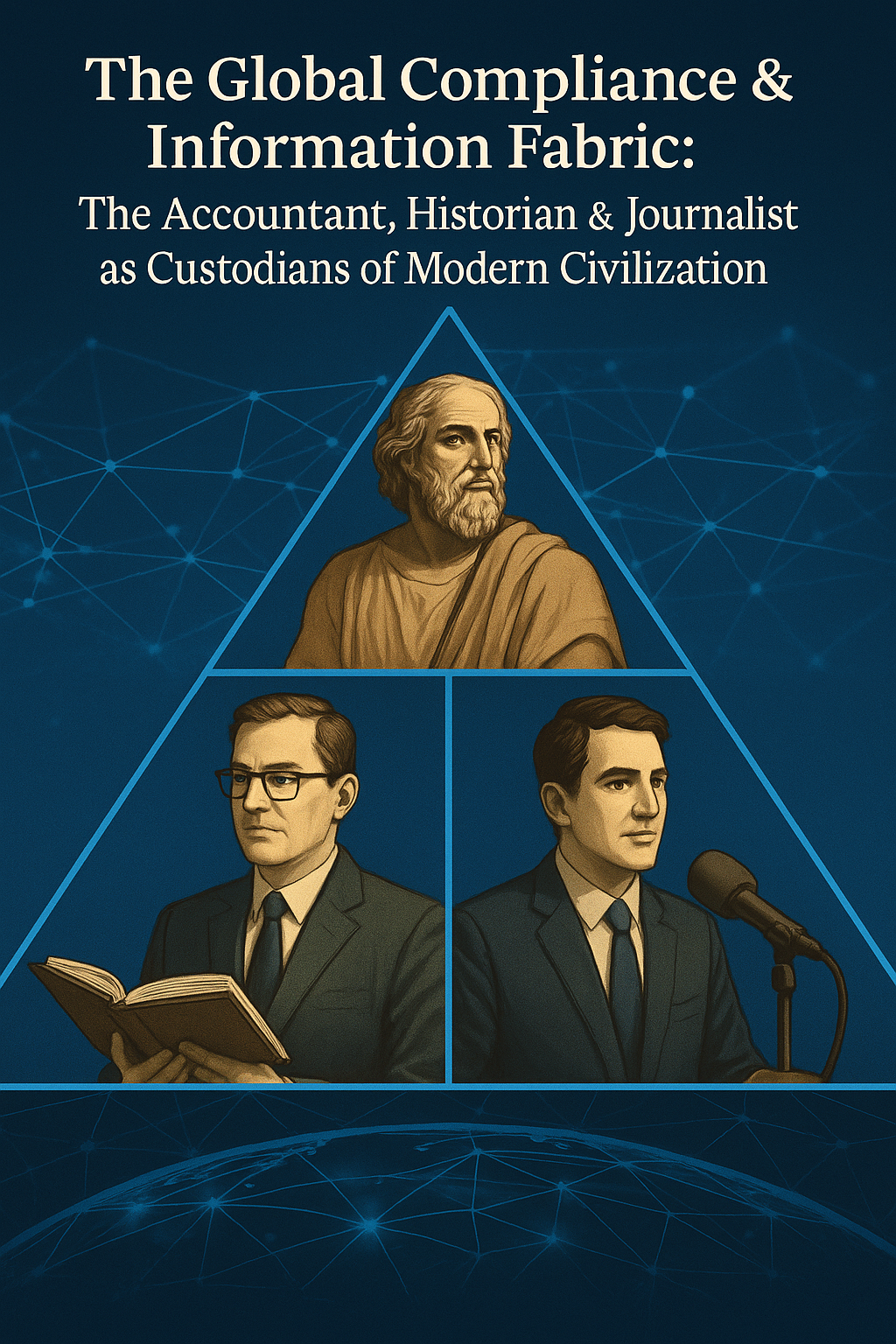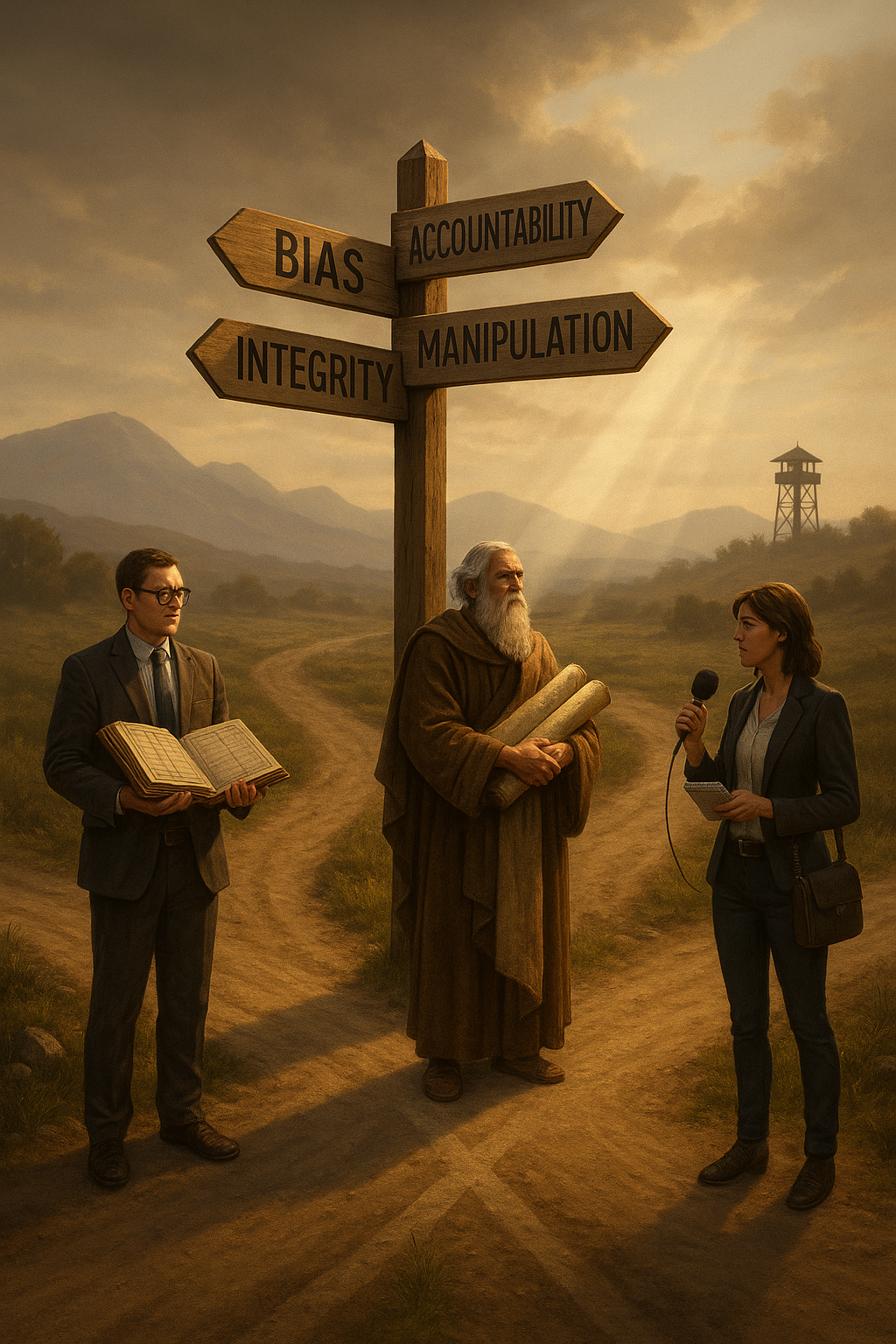
I. The Ancient Nexus: Where It All Began
Throughout history, record-keeping has always been central to civilization’s survival.
In ancient Mesopotamia (~3000 BCE), clay tablets documented not only temple accounts and grain deliveries (early accounting), but also royal decrees and public announcements (proto-history and journalism). Egyptian scribes recorded Pharaoh’s tax rolls, royal triumphs, and edicts on stone monuments, performing simultaneously as accountants, historians, and state messengers.
In Imperial China, the Grand Historian blended financial reports, imperial genealogies, and administrative records, directly influencing statecraft and public perception.
In short, the first accountants were also the first historians and proto-journalists.

II. The Divergence: From Scribes to Specialized Guardians
As civilizations matured, the unified role of the ancient scribe gradually fragmented into three distinct professions.
- In 1494, Luca Pacioli’s Summa de Arithmetica codified double-entry bookkeeping, establishing the foundation for modern global finance.
- Historians such as Thucydides, Ibn Khaldun, and Edward Gibbon advanced evidence-based methodologies that made history a science of narrative truth.
- Journalism, birthed through the printing press and Enlightenment debates, evolved into an independent force capable of checking both corporate and governmental power.
While each discipline developed independently, they remain deeply interlinked. All still serve one essential function: the preservation and interpretation of truth.

III. The Ethical Crossroads: Shared Moral Responsibilities
Despite their technical differences, accountants, historians, and journalists face parallel ethical challenges:
- Accountants are pressured to manipulate financial data for clients or governments.
- Historians face state-sponsored revisionism, suppression of archives, or selective omissions.
- Journalists contend with political censorship, ownership biases, or financial influence.
All face the temptation to trade truth for short-term gain, power, or survival.
When these failures happen, the cost is not just professional — it is systemic collapse:
- The USSR’s collapse was hastened by decades of manipulated economic data.
- Enron’s accounting fraud shattered global investor confidence.
- Revisionist narratives ignited ethnic conflicts leading to genocides.
- Fake news has destabilized modern democracies, fueling mass disinformation
IV. The Psychological Vulnerabilities: Cognitive Bias in Record-Keeping
Even without external pressures, professionals suffer internal weaknesses. Behavioral economics and psychology have exposed how:
- Confirmation bias filters data we “want” to believe.
- Anchoring bias skews first impressions.
- Availability heuristics distort risk perception.
- Motivated reasoning blinds experts to inconvenient truths.
Truth is not rejected outright — it is eroded subtly through selective attention.
Thus, even in honest professions, objective record-keeping remains psychologically fragile.
V. The Institutional Power Structures Behind Records
Beyond individual ethics lie institutional interests:
- The Big Four accounting firms audit both governments and corporations, creating conflicts of interest.
- State-funded historical commissions often serve nationalist narratives.
- Media conglomerates, controlled by few global families or governments, shape what becomes “news.”
Record-keeping is never free of power. It reflects ongoing struggles between transparency and control.
VI. The Global Information Fabric in the 21st Century
Today, the accountant, historian, and journalist are no longer purely national actors. They are woven into an interdependent Global Information Fabric—a living network of regulatory bodies, financial institutions, public archives, news platforms, and civic discourse.
For example:
- The IMF, OECD, and World Bank rely on accountants for sovereign risk assessments.
- Truth & Reconciliation Commissions (South Africa, Rwanda, Chile) depend on historians to navigate post-conflict justice.
- Investigative journalists expose cross-border crimes like the Panama Papers through collaboration with forensic accountants.
At the highest level, these professions now serve the stability of markets, democracies, and international relations.
VII. The New Threats of the Digital Age
Modern technology has magnified both opportunity and peril:
- AI and Machine Learning now generate financial reports, news articles, and even historical narratives—introducing algorithmic bias into record-keeping.
- Blockchain and Triple-Entry Accounting create immutable records — but embed any errors or falsifications permanently.
- Deepfakes and Synthetic Media threaten the very possibility of verifying truth visually or audibly.
- Big Data Surveillance empowers states and corporations to manipulate public understanding at industrial scale.
The question is no longer whether truth exists — but whether anyone can reliably authenticate it.
VIII. The Legal Dimension: Global Governance of Record Integrity
Some legal frameworks attempt to safeguard these professions:
- International Financial Reporting Standards (IFRS), FASB, and FATF seek to enforce transparent accounting.
- Historical truth commissions, such as South Africa’s post-apartheid process, attempt reconciliation through documentation.
- Whistleblower protections (LuxLeaks, Wirecard, Edward Snowden) defend those who expose internal malpractice.
- Freedom of Information Acts empower journalists to uncover state-held secrets.
But these protections remain uneven, vulnerable, and often politicized across jurisdictions.
IX. The Comparative Civilizational Perspective
Across civilizations, record-keeping shaped state stability:
- The Islamic world institutionalized financial integrity through waqf records and early inheritance laws guided by algebraic certainty.
- Rome’s Acta Diurna (Daily Acts) functioned as an early government gazette blending public finance, war reports, and state announcements.
- Imperial China’s meticulous bureaucratic archives became central to dynastic legitimacy and public order.
The global compliance architecture we see today is merely a sophisticated modern extension of ancient institutional memory.
X. Scenario Analysis: The Possible Futures of Record-Keeping
Looking ahead, we face three possible futures:
Optimistic Scenario:
Global institutions adopt shared ethical compacts; professional integrity is elevated across accounting, history, and journalism; AI governance remains accountable.
Pessimistic Scenario:
State capture, corporate monopolies, deepfakes, and algorithmic disinformation destroy public trust in all records — from financial statements to war archives.
Middle Scenario:
Patchwork governance emerges; some countries or sectors maintain integrity while others drift into informational chaos.
The battle for civilizational memory may well define the 21st century.
XI. Proposal: A Global Record-Keeping Ethics Charter
What may now be urgently needed is a Global Record-Keeping Ethics Charter that unites:
- Accountants as custodians of financial truth.
- Historians as custodians of memory and context.
- Journalists as guardians of real-time public transparency.
Each profession would hold one another accountable — recognizing that their combined failure leads not to private mistakes, but global breakdown.
Closing Thought
“In ancient temples, the scribe recorded the harvest for the king. Today, the accountant, historian, and journalist record the survival of nations.”



